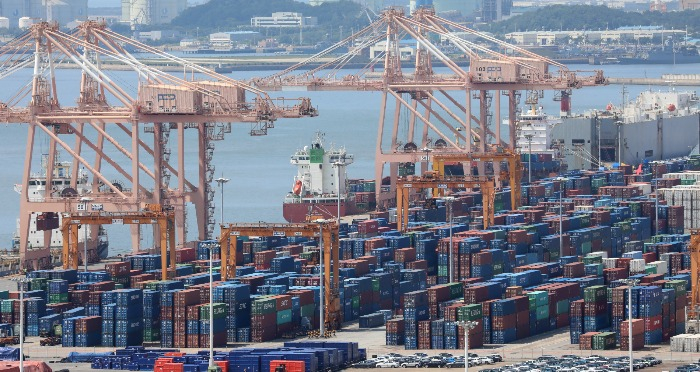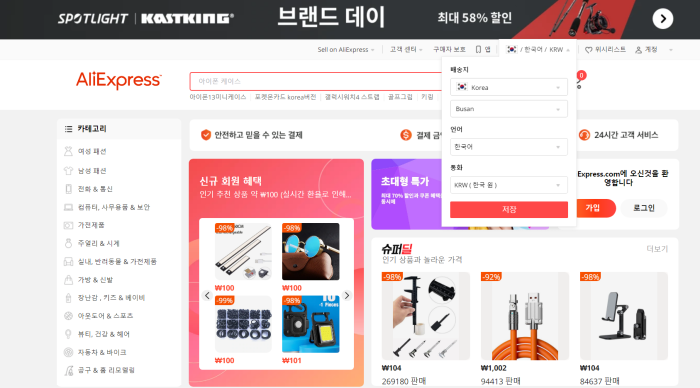Alibaba launches express ships to S.Korea as orders surge
China emerges as South Korea's largest cross-border, e-commerce market in value terms
By Jul 20, 2023 (Gmt+09:00)
LG Chem to sell water filter business to Glenwood PE for $692 million


Kyobo Life poised to buy Japan’s SBI Group-owned savings bank


KT&G eyes overseas M&A after rejecting activist fund's offer


StockX in merger talks with Naver’s online reseller Kream


Mirae Asset to be named Korea Post’s core real estate fund operator



Alibaba.com, China’s largest online marketplace, launched an express cargo ship service between South Korea and China this week to meet a surge in orders from the neighboring country, according to retail industry officials and Chinese media reports on Wednesday.
Alibaba’s logistics arm Cainiao will operate six container ships to South Korea a week. They will depart from the Chinese ports of Weihai and Yantai in the vicinity of Shandong on the Yellow Sea.
China’s e-commerce platforms have been attracting South Korean shoppers, especially those in their 20s and 30s, with a broad assortment of products at modest prices.
“This proves the explosive growth in the direct purchase market for Chinese goods,” said a South Korean logistics company official, referring to the express cargo ship launch by Cainiao.
The express shipping service will cut the delivery time to South Korea to within three days of online purchase on average from within five days, according to AliExpress, an e-commerce platform under Alibaba.
Its container ships will arrive at the port of Pyeongtaek in South Korea, 70 km west of Seoul, about 13 hours later.
They will carry about 200 forty-foot-equivalent-unit (FEU) shipping containers on average. One FEU container measures 40 feet in length and 8 feet in width, carrying a payload of 26,730 kilograms.

South Koreans’ merchandise purchases from China’s online platforms have almost doubled over the past few years, whereas those from the US dropped last year.
In 2022, China outpaced the US as the largest foreign online market for South Koreans in terms of value. It marked the first time for China to become South Korea’s largest cross-border, e-commerce market since the relevant data started to be compiled.
Last year, South Koreans spent a total of $1.7 billion buying goods online from China, up 32% on-year. That contrasted with a 15% decline to $1.6 billion in their spending on US e-commerce platforms, according to the Korea Customs Service.
Retail industry officials said merchandise purchases from Chinese online malls will surpass 60 million parcels this year, compared to 30.7 million parcels in 2020.

As containers shipped from other countries are piling up, about 650,000 packages have not cleared customs at South Korea’s major ports and airports, according to shipping and logistics companies.
Due to the delayed process, they said about 700,000 packages have not yet been shipped from China and other foreign countries.
ALIEXPRESS
AliExpress launched a South Korea-dedicated platform in 2018. Since then, it has expanded its share to 26.6% of South Koreans' cross-border online purchases in 2022 in terms of value, versus 16% in 2020. It will deliver almost every product, including one-dollar items.
Last November, it opened a customer service center in the country to allow its customers to return goods free of charge.
“It is stepping up marketing efforts in South Korea because of the high purchasing power of consumers and low logistics costs due to its proximity to China,” said one of the retail industry officials.
Along with the rise in cross-border online shopping, however, shipments of knock-offs and illegal drugs are on the rise as well.
Between 2018 and 2022, a total of 1.9 trillion won ($1.5 billion) worth of cross-border shipments from China were classified as imitations, according to the Korea Customs Service.
Write to Hun-Hyoung Ha at hhh@hankyung.com
Yeonhee Kim edited this article.
-

-
 LogisticsCJ Logistics expands global e-commerce shipping services
LogisticsCJ Logistics expands global e-commerce shipping servicesDec 14, 2022 (Gmt+09:00)
2 Min read -
 RoboticsKorea’s e-commerce giant Coupang to invest in logistics automation
RoboticsKorea’s e-commerce giant Coupang to invest in logistics automationNov 29, 2022 (Gmt+09:00)
1 Min read -
 E-commerceNaver to buy Poshmark at $1.6 bn to boost US e-commerce biz
E-commerceNaver to buy Poshmark at $1.6 bn to boost US e-commerce bizOct 04, 2022 (Gmt+09:00)
2 Min read


